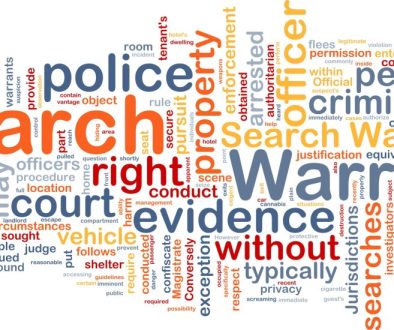Probable Cause & Illegal Search & Seizure – What you really need to know about it when you arrested for an illegal gun or drug crime?
Our criminal defense law firm represents persons charged with a variety of crimes and offenses in Pennsylvania and New Jersey. Many of these cases are possessory crimes and involve the illegal possession of some type of contraband such as an illegal gun, firearm, narcotics, or drug.
The 4th Amendment to the U.S. Constitution and Article 1 Section 8 of the Pennsylvania Constitution, along with Paragraph 7, Section 2 of the New Jersey Constitution, protects persons from illegal searches and seizures. A search and seizure is based on three levels of interaction between persons and police officers and require different levels of justification based on the nature of the interaction.
What are the 3 types of police encounters?
These 3 levels of category interaction include the following:
- Mere encounter.
- Investigated detention.
- Custodial detention.
A mere encounter doesn’t need to be supported by any level of suspicion but carries no official compulsion to stop or respond by the citizen or person. This basically means that a person can just walk away from police
An investigative detention however must be supported by a reasonable suspicion. An investigative detention subjects a person to a stop but the detention cannot involve any course of conditions to constitute the functional or equivalent of an arrest. Finally, a custodial detention (arrest) must be supported by probable cause. This is the highest level of police/person interaction and therefore requires the highest level of constitutional protection
Traffic Stops & Probable Cause
A traffic stop is based on an observed violation of a vehicle code. The officer, therefore, must have probable cause to make a constitutional traffic stop.
Pennsylvania and New Jersey makes it clear that police officers have probable cause to stop a motor vehicle if the officer observes a traffic code violation, even if it is a minor offense, like a taillight.
The 4th Amendment to the U.S. Constitution protects persons against unreasonable searches and seizures. In Pennsylvania (but not New Jersey) police officers may not conduct a warrantless search unless one of the several recognized exceptions applies. The biggest exception is consent. This is why our criminal defense lawyers always advise and tell clients to NEVER consent to a search! This consent, however, must be voluntarily given by the person.
How will criminal court evaluate consent?
A Court will determine consent based on the following factors:
- Initial assessment of the constitutionally valid police/citizen encounter giving rise to consent (stop).
- The voluntariness of the consent.
To establish voluntary consent, the prosecution must prove that the consent is a product of essentially free and unconstrained choice; not the result of duress, coercion or any type of expressed or implied force.
Who has the burden to prove consent to search is voluntary?
The burden is on the prosecution to prove by clear and convincing evidence that the valid consent was given. The Court will conduct an analysis of the totality of all the circumstances to determine if a consent is voluntary and will utilize the following factors.
- Presence or absence of police in excess.
- Whether there is physical contact with the officer.
- Whether police directed citizens movements.
- Police demeanor and manner of expression.
- Location of the interdiction.
- Content of the questions and statements.
- Existence in character of the initial investigated detention.
- Whether the person has been told he or she is free to leave.
- Whether the citizen has been informed that he is not required to consent to a search of his property or his person.
Why does the “expectation of privacy” matter in your criminal case?
To assert a right against an illegal search and seizure, however, a person must have reasonable expectation of privacy in the property searched. A Defendant who is charged with a possessory crime (illegal drugs or narcotics, firearms, or guns) has an automatic standing to challenge a search. The Defendant, however, must show he has a privacy interest in the area searched to assert his constitutional rights.
A driver who does not own a vehicle may establish an expectation of privacy in that vehicle if he can prove that he has permission or authority from the owner to drive the vehicle. The Defendant has no expectation of privacy in a vehicle that he does not own, a vehicle that was not registered to him or one where he does not show authority to operate the vehicle.
Contact Our Criminal Defense Lawyers in PA & NJ
Please click here to contact our Philadelphia criminal defense lawyers. We offer free case reviews and serve the following areas in Pennsylvania and New Jersey, Atlantic City, Camden, Cherry Hill, Chester, Conshohocken, Doylestown, Media, Norristown, Philadelphia, Pottstown, Salem, Upper Darby, Upper Merion, Upper Providence, Vineland & Woodbury areas.



